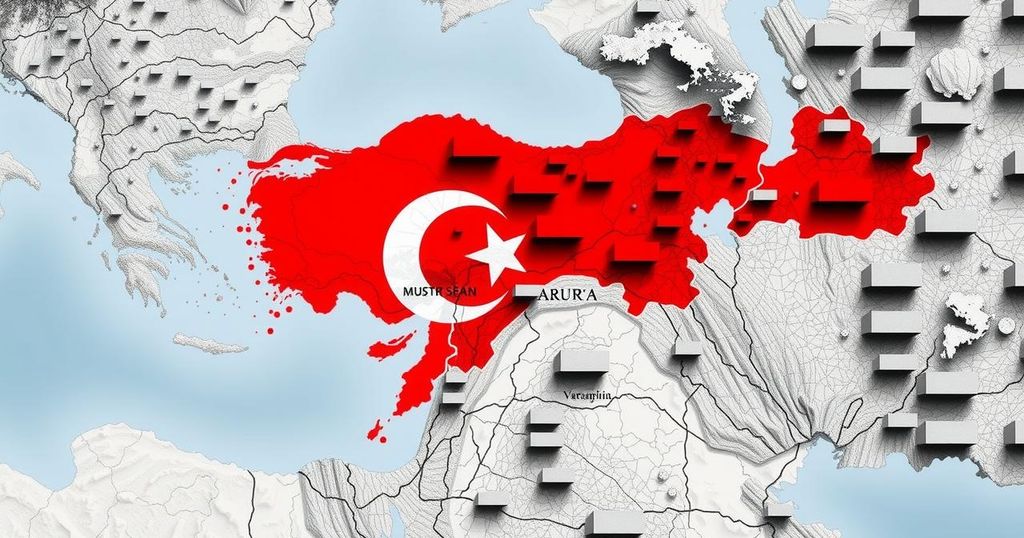Turkey’s Ascendance: A New Power Dynamic in the Middle East

Turkey’s rise as a regional power follows the expected downfall of Assad’s regime, overshadowing Iran’s influence and altering the Middle Eastern geopolitical landscape. With solid support for Syrian rebels, Turkey secures a stronger foothold in Syria and Iraq while extending its reach into nations like Somalia and Libya. This dynamic presents unique challenges for Saudi Arabia and the UAE, as Turkey’s Sunni credentials complicate the sectarian landscape previously dominated by Iran’s Shia-centric policies.
The geopolitical dynamics in the Middle East are experiencing a significant transformation due to the ascent of Turkey as a regional power, particularly following the anticipated demise of Bashar al-Assad’s regime in Syria. This development has shifted the landscape, previously dominated by Iran’s influence, creating a new paradigm for diplomatic and military engagement from the Horn of Africa to Central Asia. President Recep Tayyip Erdoğan’s steadfast support for Syrian rebels has been pivotal in this transition, earning Turkey a formidable role among regional players.
Turkey’s commitments included intelligence sharing, logistical support, and protection for the rebels, leading to a remarkable success characterized by a lesser degree of violence compared to previous years of conflict. As Iran’s influence wanes due to resource constraints and geopolitical distractions, such as its entanglement with Israel and the ongoing conflict in Ukraine, Turkey is poised to fill the void left in both Iraq and Syria. The establishment of a Sunni-led government in Syria bolsters Turkey’s position against Iranian-backed Shia militias in Sunni-majority regions of Iraq, indicating an erosion of Iran’s power.
Turkey’s ambitions extend far beyond its immediate neighbors; it is now increasingly influential in Africa and beyond. Recent diplomatic achievements include mediating agreements between Somalia and Ethiopia and supporting the legitimate government in Libya. The backing of the Taliban in Afghanistan further consolidates Turkey’s status, as does its military alliance with Azerbaijan during the recent Nagorno-Karabakh conflict.
This evolving geopolitical landscape poses challenges for Saudi Arabia and the UAE, who previously countered Iran’s influence based on sectarian divides. Turkey’s Islamic orientation allows it to garner wide Sunni support, complicating Riyadh’s historical role as the leader of Sunni Muslims. Unlike Iran, which operates through proxy groups like Hezbollah, Turkey’s direct support for local factions grants it a more robust legitimacy in the region, undermining Saudi claims to leadership.
The long-standing dominance of Iran’s “Shia crescent,” which symbolized its control over key Middle Eastern regions, is now under threat. This once-unassailable corridor has weakened due to Turkey’s increasing influence, severing Iran’s vital supply lines and isolating its regional allies. Hezbollah’s power in Lebanon is being challenged as well, reflecting the broader decline of Iranian hegemony.
Turkey’s approach combines military prowess, diplomatic engagement, and economic investment, presenting a contrast to Iran’s more aggressive tactics rooted in sectarianism. This multifaceted strategy allows Ankara to cultivate relationships across different ideological groups, broadening its influence in the region.
The next chapter in Middle Eastern geopolitics will likely revolve around Turkey’s expanding role, with regional players reassessing their strategies. Competing interests will increasingly focus not on counteracting Iranian ambitions but on navigating the complexities of a resurgent Turkey. This evolution necessitates a reevaluation from both allies and adversaries, bridging a pivotal moment in contemporary history.
In the wake of the Syrian civil conflict, the balance of power in the Middle East has begun to shift significantly. The anticipated collapse of the Assad regime, long supported by Iran, has apparent implications for its regional influence. This shift parallels Turkey’s rise as a leading Sunni power, particularly through its consistent military and political backing of opposition groups in Syria. The dynamics involved are not just limited to Syria but have wider implications across neighboring countries, including Iraq and influential regions beyond, such as Africa and the Caucasus. Understanding this backdrop is crucial to comprehending the more complicated relations now emerging in the Middle East, especially in regard to the roles of Turkey, Iran, and Saudi Arabia.
In conclusion, Turkey’s rise as a regional power signifies a marked geopolitical shift in the Middle East, with implications that extend well beyond its borders. The decline of Iranian influence offers Ankara an opportunity to assert its position as a Sunni leader, fostering alliances and support among various factions across the region. As the international community watches, the coming years will likely witness complex interactions as regional powers adjust to this new order, centering increasingly on Turkey’s role in shaping future policies and alliances.
Original Source: www.theguardian.com








